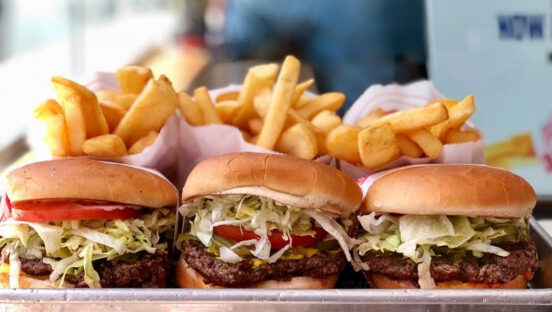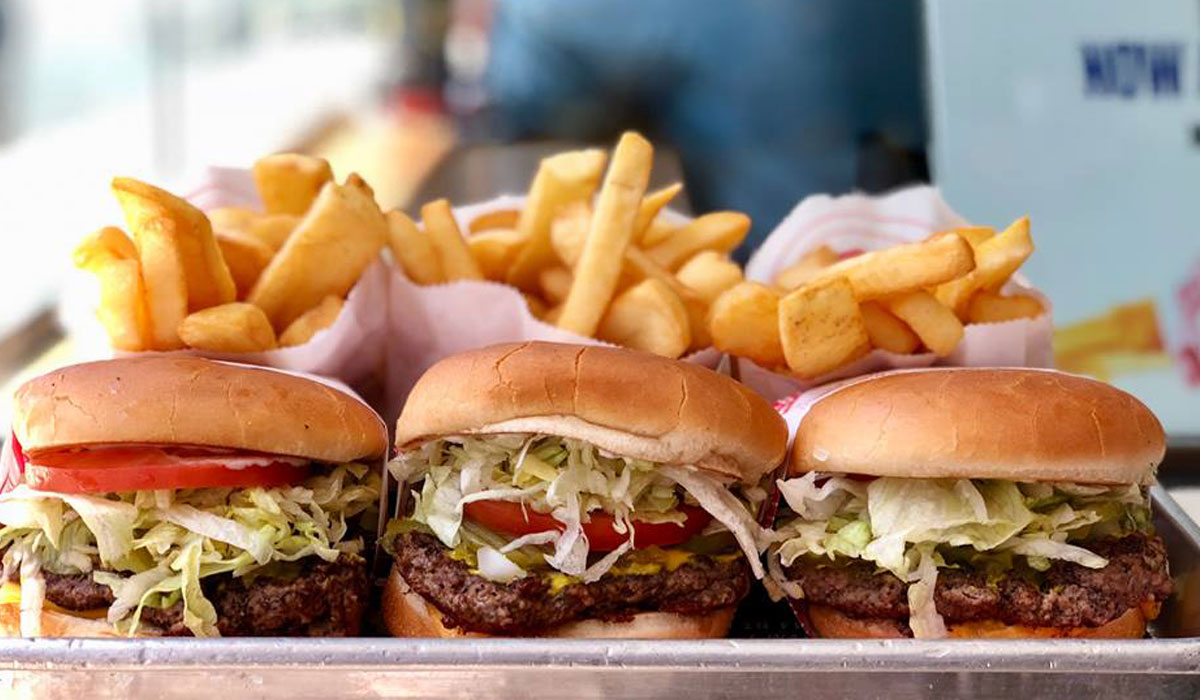What’s taking shape at FAT Brands lately could be the future for a lot of restaurant brands. Argue the merits, incrementality, and stability of third-party delivery, but there’s no denying its trajectory. Investment firm William Blair & Co. estimates sales of online delivery will hit $62 billion in 2022, up from about $25 billion today. And while it’s likely to change drastically before then, it’s not about to go the way of the floppy disk.
Ask two operators what the biggest hurdle with third-party delivery is, though, and it would be like grabbing a response out of a bingo spinner. Fees are, of course, always top-of-mind. Yet so is the notion that leading platforms, like DoorDash, Grubhub, and Uber Eats, satisfy app-loyal customers. They pour more water into the delicate concentrate of brand loyalty.
Customers search more for products, such as burgers, than they do Burger King. It’s why some chains have toyed with the notion of developing ghost concepts within their own restaurants. Say, a salad brand that pops onto the platform as, hypothetically, “Famous Salads,” but still serves salads made in Famous Dave’s kitchens. Now, guests looking specifically for salads will see the brand rank without needing to search for Famous Dave’s and then scroll through to its salad section. (This is something the barbecue brand is looking at).
FAT Brands’ efforts don’t exactly mirror that template, but they’re not far off, either. Throughout the summer, Fatburgers across LA morphed into virtual kitchens for its sister concept, Hurricane Grill & Wings. The change led to an additional $2,000–$5,000 per week in sales for those Fatburger franchisees, the company said. Furthermore, 75 percent of customers in the added sales were first-time visitors who hadn’t tried Fatburger before.
FAT Brands runs Fatburger, Hurricane Grill & Wings, Buffalo’s Café, Buffalo’s Express, Yalla Mediterranean, Ponderosa and Bonanza Steakhouses, and, most recently, Elevation Burger, which it scooped up for $10 million in June. In total, the publicly traded company franchises about 400 locations worldwide.
Concerning this virtual kitchen topic, it’s easy to see the potential in a diverse multi-concept franchise portfolio like FAT Brands. It’s almost like the co-branding manifestation of the future, but with a much friendlier real estate bill.
READ MORE:
ARE GHOST KITCHENS THE FUTURE?
Andy Wiederhorn, president and chief executive officer of FAT Brands, says the strategy evens the delivery playing field. “We have a way to be very competitive compared to someone who has to build their own restaurant,” he says. “We don’t have that cost.”
Naturally, there needs to be some synergy between the concepts when it comes to equipment. After that, though, it’s just a matter of making sure the supply chain lines up and concepts are stocked with the right packaging, sauces, products, and so forth.
“You can then put [the concept] on the delivery apps and you have Fatburger in 10 markets where you have 10 Hurricane Grill & Wings, but, again, we don’t have to go through the cost of building the restaurants,” Wiederhorn says.
This is just one growth lever gaining momentum at FAT Brands. The company’s acquisition of 44-unit Elevation Burger, a fast casual founded 2002 by Hans Hess, likely won’t be FAT Brands last this year.

Wiederhorn says the company has “an active pipeline of acquisition opportunities,” and expects to make “one or two more,” before 2020.
“We don’t have a pizza brand yet,” he says. “We don’t have a coffee and dessert brand. We don’t have a sandwich brand. Those kinds of things would round out our portfolio. But there would also be no issue adding another burger or wings brand, if it made sense geographically or in terms of product offering.”
Elevation Burger is a good example. Yes, FAT Brands was in the burger game already. But Elevation gives the company an East Coast presence it lacked before, with 30 or so units scattered up and down the region. Hollywood-famous Fatburger returned to the East Coast in June with a co-branded (with Buffalos Express) restaurant in Trout Run, Pennsylvania. A Cherry Hill, New Jersey, store opened later in the month. Now, they can scale together.
In addition to the map expansion, Elevation gave FAT Brands a specialized platform. It features differentiators that appeal to perspective and current franchisees and helps aid the cross-selling process for FAT Brands. Things like grass fed, USDA certified organic, halal, fresh-cut fries cooked in olive oil, etc. FAT Brands can sprinkle Elevation into markets where these sorts of trends have traction, like California and New York.
Wiederhorn says Elevation “didn’t really get big enough to move the needle anywhere,” which led to the founders looking for a way to capitalize on their efforts.
“We say when these smaller brands come under our platform, look, you’re going to get better purchasing power. And you get the benefit of our marketing department where we don’t have to reinvent the wheel every time,” Wiederhorn says.

FAT Brands, especially its burger and wings brands, can run similar promotions across the system tailored to the customization of a particular brand name. It can also do things like roll plant-based proteins, such as the Impossible Burger, across all multiple brands, which it did minus the steakhouses. It’s been a hit at Yalla—a five-year-old fast casual FAT Brands bought in August 2018.
In the second quarter of fiscal 2019—announced August 13—the company posted total revenues of $5.9 million, up 50.8 percent from $3.9 million in the prior-year period.
Broken down by brands, here’s how FAT Brands’ Q2 same-store sales, year-over-year, shook up.
- Fatburger: –1.7 percent worldwide; –0.6 percent North America.
- Buffalo’s Café: 0.8 percent.
- Hurricane Grill & Wings: 4.9 percent
- Ponderosa/Bonanza: –2.7 percent
As a company, FAT Brands’ systemwide sales upped 26.3 percent driven primarily by the $12.5 million acquisition of Hurricane Grill & Wings in July of last year.
Hurricane has enjoyed a pretty dramatic turnaround since the deal. It pushed negative comps in the mid-single digits before FAT Brands came in. Thanks to a new advertising campaign, Wiederhorn says, the numbers flipped around.
FAT Brands has also seen success with co-branding locations, which, historically, carry a bit of a troubled stigma for some operators. It was a path that didn’t pan out at times for A&W and Long John Silver’s.
Wiederhorn says co-branding success is really determined by whether or not the concepts fit in a way that drives up check. FAT Brands estimates its co-branding initiatives result in a 20–30 percent increase in average-unit volumes compared to stand-alone stores, with minimum incremental cost to franchisees. Burgers and wings, for instance, make sense. “People who were getting burgers, including an Impossible Burger, and then they can get a basket of wings to share if they want. That’s the menu diversity that it creates,” he says.
“It’s marginally very profitable for the operator,” Wiederhorn adds, “because they have to buy a bit more equipment, a bit more signage, but can get a higher average check. AUVs increase because you’re selling more product. And when you put it on the delivery platforms it really pays off because we’re able to offer multiple brands out of one kitchen.”
FAT Brands’ franchisees opened eight new restaurants in Q2: a co-branded Fatburger and Buffalo’s Express in Huntington Beach, Glendora, and Monrovia, California. The Trout Run store. Locations in Pine Centre and Langford, British Columbia; a Beijing, restaurant; and one in Tempe Arizona.
Year to date, FAT Brands has opened 16 franchises compared to 14 during all of 2018. The goal is about 30 units in 2019 and the pipeline has more than 200 restaurants worldwide yet to be built, Wiederhorn says.
FAT Brands announced last quarter a three-unit development deal for co-branded Fatburger and Buffalo’s Express locations in the Dallas-Fort Worth market; a 10-unit agreement deal for co-branded locations in Canada; a 25-unit deal throughout Dallas, Houston, San Antonio, and Austin, Texas; a development deal for Fatburger in Albuquerque, New Mexico, in partnership with Isleta Resort & Casino; and a development deal for Fatburger in the Rolling Hills Casino in Northern California.










